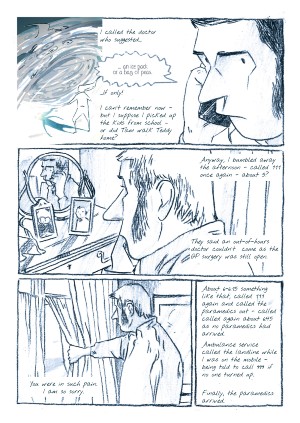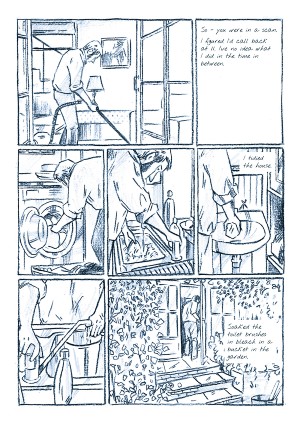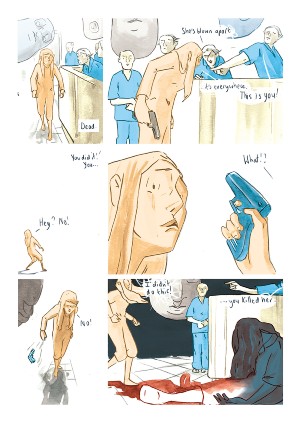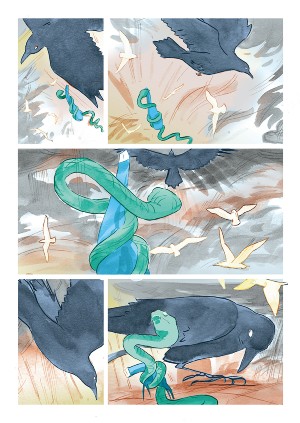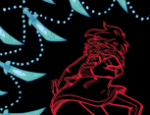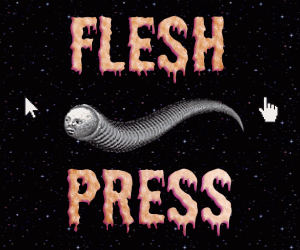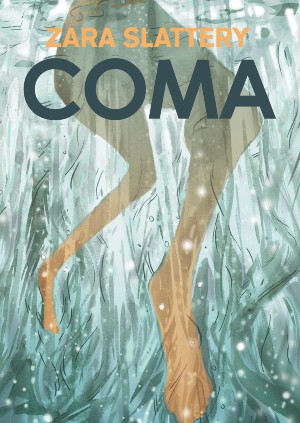 To class the collaborative nature of a comics narrative as “unique” runs the obvious risk of accusations of hyperbole. But Coma, the debut long-form comics work from artist Zara Slattery, is a graphic memoir that can only be described in such terms. Detailing the 15 days Slattery spent in an induced coma via dual perspectives it is in part based on the diary observations at the time of her partner Dan. Coma jumps back and forth between Slattery’s comics re-creation of those daily accounts of family life in a time of unimaginable stress and Slattery’s visualisation of her own hallucinatory perceptions in that two-week period.
To class the collaborative nature of a comics narrative as “unique” runs the obvious risk of accusations of hyperbole. But Coma, the debut long-form comics work from artist Zara Slattery, is a graphic memoir that can only be described in such terms. Detailing the 15 days Slattery spent in an induced coma via dual perspectives it is in part based on the diary observations at the time of her partner Dan. Coma jumps back and forth between Slattery’s comics re-creation of those daily accounts of family life in a time of unimaginable stress and Slattery’s visualisation of her own hallucinatory perceptions in that two-week period.
Coma has been a much anticipated work given the recognition it had gained long before publication. It was shortlisted for the Myriad Graphic Novel Competition in 2018, longlisted for the Laydeez do Comics Prize in 2019, and Slattery was shortlisted for the Arts Foundation Futures Awards in 2020. That’s quite a lead-up to publication!
In 2013, after suffering from a persistent sore throat for some time, Slattery’s condition began to deteriorate to such a degree that she was hospitalised. Bruising on her leg turned out to be symptomatic of a serious bacterial infection that would lead to her being placed in an induced coma and eventually to the amputation of the affected leg. Coma explores that time period through those two interweaving story strands.
In the first, through Dan’s written account, we watch as the family struggles to come to terms with these devastating events, how they deal with the constant spectre of loss that hovers over them, and how they attempt to continue with the everyday routines of after-school activities, preparing for a birthday party, and shopping trips. The second deals with Slattery’s own interpretation of what was happening; a kind of synthesis of hallucination and skewed perception and a journey through her own mindscape during her time in the coma.
The result is a fascinating juxtaposition of the same battle from markedly different frontlines. Dan’s attempts to keep an illusion of stability while preparing for the worst are rendered by Slattery in a stark black and white, emphasising perhaps the pedestrian nature of the outer world even in a time of crisis but through that lack of colour also underlining a sense of bleak and overwhelming desperation. Conversely, Slattery’s nightmarish reality within her coma is depicted in vibrant but unsettling colour as she struggles to make sense of what is going on. Real world events and mythological delusions merge as the influences of the “outer world” and her inner thought processes fluctuate; mental confinement and maternal concerns coming to the fore as Slattery’s worries and disorientation are formed into a dream-like narrative by her psyche.
What makes Coma such a triumph is this parallel exploration of the same fears and emotions from two such very different yet obviously inextricably interconnected perspectives. Helplessness, terror, quiet determination, confinement and impotent despair… all reflected from one storytelling aspect to its counterpart as if in the most distorted of mirrors. It’s a remarkable debut book in a year of remarkable debut books so far for Myriad Editions and, while UK small press fans will long be aware of Slattery’s work, Coma signifies the arrival of a major new talent on the wider comics scene for the far more expansive audience she deserves.
Zara Slattery (W/A) • Myriad Editions, £18.99
Review by Andy Oliver





